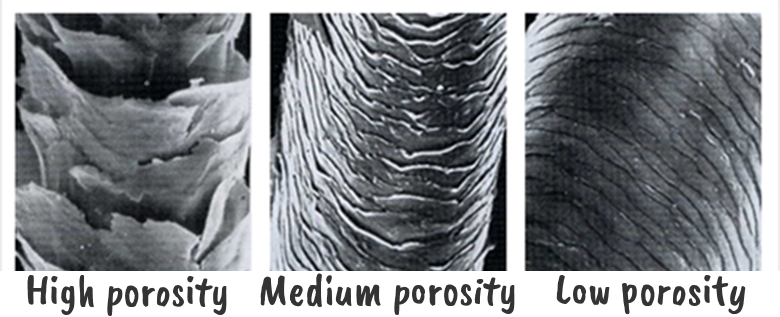What makes your hair Frizzy?
- Nasuha Hamdi

- Nov 3, 2017
- 4 min read
If you have ever wondered why your hair gets more frizzy during certain periods then others or just concerned about why it frizzes 365 days a year, this article may shed some light on the factors of frizz. You will be able to identify which is the causing factor for your frizz.
A strand of hair under a microscope will look like either a smooth spaghetti or a fraying rope. You will have hair cuticles that lay flat or raised when there is some level of damage. Depending on how raised the cuticle are will determine the porosity of your hair, if it is able to retain and hold moisture.

A tendency for frizz to happen is when the hair cuticles are raised, allowing moisture to easily get absorbed as easily as it can fade away. This characteristic is often more noticeable with people who have dry hair with lackluster shine. As we all know humidity is one cause of frizz, but is it the only factor for hair getting frizzy? Below are some other reasons why frizz can happen to you!
1. Humidity
We all know that humidity is one main factor for frizziness as it dries out the moisture from the hair faster. With the moisture evaporating from the hair faster, it creates raised cuticles which creates more static when rubbing against each other. If you have higher porosity hair, you will probably realise that your hair gets frizzy or feels dry a lot. This is because the hair is unable to retain moisture properly and thus would require more after wash haircare like nourishing serums etc. Some serums you can use to combat the humidity instantaneously using anti-frizz serums. For most frizz, smooth and shine products in the industry contains silicone ingredients. These ingredients are useful to cover the gaps in between the raised cuticles. If you like to use a more organic or natural alternatives, not limited to oils like Coconut, Jojoba, Argan, Avocado oils are good remedies for moisturising as well.
2. Lack of moisture
When you moisturise your hair, you are able to flatten the hair cuticles, retaining the moisture in your hair for longer period of time. When your hair is sufficiently hydrated, it will feel soft and smooth as the raised cuticles lay flat against the cortex of the hair, locking in the moisture and giving the hair a very hydrated and frizz-free appearance. For those who have high porosity hair, you are able to absorb moisture easily, however it will also fade quickly. Medium porosity will have good absorbency and also holds moisture well for longer periods of time. Low porosity however have difficulty to retain new moisture and will take longer for it to penetrate. Sometimes when you have low porosity hair, it may seen that you have hair that is virtually waterproof, but that is because your hair cuticles are tightly sealing around the cortex of the hair.
Lack of moisture can also mean that you are dehydrated and not drinking enough water to supplement your body. Think of this, your hair is the last thing your body wants to give nutrients to if your body is lacking of these nutrients. So take care of your body and consume nutrient rich food that will benefit general maintenance. Deep conditioning once a week or every fortnight would be a great addition to the regimen to hydrate your hair. Usually the effects of the deep conditioning will improve your hair texture for at least a week even during hair washing days.
3. Hair damage by colouring & styling
When you use relaxant or even bleaches, the harsh chemicals in the hair dyes will often cause permanent damage to your hair. The chemicals will cause the cuticles to raise up and swell. Often times after high lifting of colour, you wont notice with the naked eye that the cuticles stating to flake off, but you will definitely notice more breakages. That's why some people consider that their hair texture is rough and dry, like 'hay' after awhile of using hair dyes. They will start to notice that their hair is more frizzy and also needs more conditioning and treatments to get it to a smooth and shiny state temporarily.
You can combat this by simply loping it off bit by bit till the healthy hair grows back, or ensure that you are diligently moisturising and deep conditioning your hair to reduce the frizz. Using a hydrating shampoo and conditioner as well as diligently using a hair mask to moisturise will temporarily help your hair. However you must realise that this is not a repairing solution to those damaged ends. You can initiate a more hydrating and repairing haircare regimen, however it is will only be temporary.
My hair has gone through all of the above especially since I live in Singapore where the humidity is usually above 80%. I've dyed my hair and went through minor breakage and frizz. I've also went through the lack of moisture in my hair as I was not educated on how to manage my hair when I was younger and I hated my hair. I've always thought of straightening it when I was 12 years old but soon realised that it would cost a lot of maintenance to upkeep a rebonded hairstyle. I just didn't have money for that.
Ultimately I'm pretty sure we all have been through any of this process of frizz regardless of hair type. These are just some of the most common occurrences of frizzy hair, there could be others which I did not mention here but just know that you are able to overcome the frizz and have healthy beautiful hair.
Till next time!
MSCHFF Managed!
xoxo




Comments